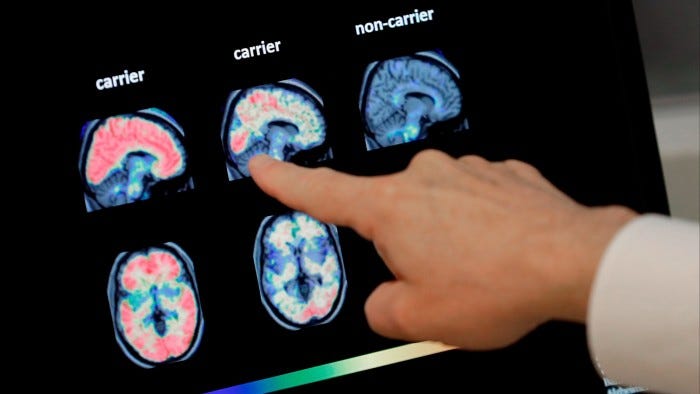thehealth.foundation/ the alzheimer institute
Joaquim Cardoso MSc
January 23, 2023
This is an Executive Summary of the article “Blood test boosts hopes of early Alzheimer’s diagnosis”, published by the Financial Times, and authored by Donato Paolo Mancini
What is the message?
The development of a commercially available blood test, known as the p-tau217 immunoassay, offers high accuracy in detecting Alzheimer’s disease, even in its early stages.
This non-invasive and less expensive alternative could significantly improve access to early diagnosis, potentially enabling patients to benefit from emerging treatments that slow the progression of Alzheimer’s.
One page summary
A recent study conducted by Sweden’s Gothenburg University reveals promising results for a commercially available blood test, the p-tau217 immunoassay, in detecting Alzheimer’s disease with high accuracy, even in its early stages. Currently, Alzheimer’s diagnosis involves invasive and costly procedures such as lumbar punctures or tomographic scans, leading to long wait times for patients.
The study, encompassing 786 participants, demonstrated that the blood test identified tau, a protein associated with toxic brain build-up in Alzheimer’s patients, with accuracy comparable to traditional cerebrospinal fluid biomarkers. Published in the JAMA Neurology journal, the results indicate the blood test’s reliability in early-stage Alzheimer’s, offering a less invasive and more accessible alternative for diagnosis.
Experts, including Charles Marshall from Queen Mary University of London and Richard Oakley from the UK’s Alzheimer’s Society, express optimism about the study’s potential impact. Marshall emphasizes the hope that such blood tests could improve access to early diagnosis, allowing individuals with memory problems to benefit from emerging treatments that slow Alzheimer’s progression.
Despite the positive outlook, caution is advised. Further evidence is deemed necessary to establish the blood test’s ability to accurately diagnose individuals in the early stages of developing dementia and identify those likely to benefit from specific treatments. Richard Oakley sees the study as a significant step in the right direction, potentially eliminating the need for follow-up tests to confirm the blood test’s findings.
Considering the limited availability of invasive tests in memory clinics, the blood test could democratize access to early Alzheimer’s diagnosis. Oakley emphasizes the importance of early, accurate diagnosis for patients to be eligible for potentially groundbreaking drugs by companies like Japan’s Eisai and Eli Lilly of the US, which have shown promise in slowing the disease’s progression.
The study marks a significant advancement in Alzheimer’s diagnostics, presenting a non-invasive and accurate alternative to existing methods. While the potential benefits are evident, further research and evidence gathering are recommended to validate the blood test’s effectiveness, and efforts should be made to ensure global regulatory approval, widespread adoption in healthcare, and increased public awareness.

Examples and Statistics
- The blood test, p-tau217 immunoassay, demonstrated “high accuracy” in identifying tau, a protein associated with toxic brain build-up in Alzheimer’s patients, across all 786 participants in a study conducted by Sweden’s Gothenburg University.
- The results, published in the JAMA Neurology journal, were comparable to the accuracy of invasive and expensive tests like lumbar punctures and tomographic scans.
- Lumbar punctures and tomography scans for Alzheimer’s are available in only about one out of 20 memory clinics in the UK’s NHS.
- The study is seen as a promising step, with potential benefits of avoiding follow-up tests for patients due to the test’s accuracy.
- There are potentially groundbreaking drugs by Japan’s Eisai and Eli Lilly of the US that could slow the progression of early-stage Alzheimer’s. However, patients would need an early, accurate diagnosis to be eligible for these treatments.
Conclusions & Recommendations
The blood test presents a significant advancement in Alzheimer’s diagnosis, offering an accurate and less invasive alternative to existing methods.
The potential for earlier diagnosis is crucial, especially with promising drugs in the pipeline that could slow the disease’s progression.
However, caution is advised, and further evidence is needed to establish the blood test’s ability to accurately identify individuals in the early stages of dementia and determine eligibility for specific treatments.
- Further research and evidence gathering: Continue studying the effectiveness and reliability of the blood test in accurately diagnosing early-stage dementia.
- Wider adoption in healthcare: If proven effective, advocate for the integration of the blood test into routine diagnostic procedures to enhance accessibility for patients seeking help for memory problems.
- Global regulatory approval: Work towards gaining global regulatory approval for the blood test, ensuring it meets necessary standards for widespread use.
- Public awareness and education: Increase awareness among healthcare professionals and the public about the potential benefits of early Alzheimer’s diagnosis and the availability of this blood test.
Names mentioned
Experts, including Charles Marshall from Queen Mary University of London and Richard Oakley from the UK’s Alzheimer’s Society, express optimism about the study’s potential impact.












